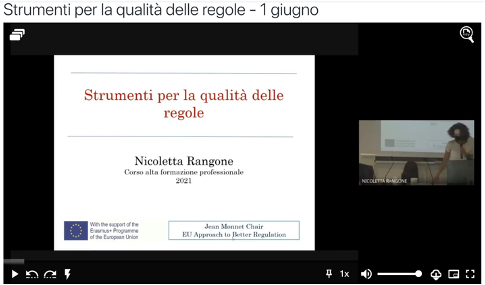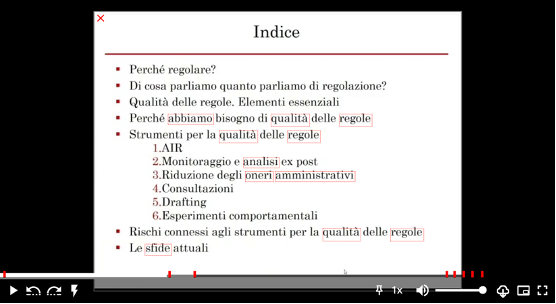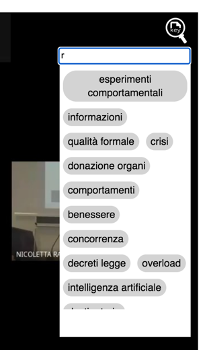This is an archive of the EU Approach to Better Regulation course that took place from 2019 to 2022 within the framework of the Jean Monnet Chair on EU Approach to Better Regulation, and from 2016 to 2019 within the JM Module on Better Regulation.
WHAT IT WAS?
- EU Approach to Better Regulation was a multidisciplinary course of 40 hours in English - 6 CFU
- Students (over 400) have learnt how to improve the quality and effectiveness of rules in the regulation life-cycle. Better regulation tools (e.g. impact assessment, regulatory burden measurement and consultation) were addressed, and their pros and cons were discussed. The course also dealt with the use of cognitive insights into regulation and how it challenges public decision-making, the regulatory options, and the functioning of better regulation tools
- Students were involved in interactive lessons and case studies, legislative clinics, and workshops. Some topics were also addressed through flipped classrooms, in order to improve the ability to interact in interdisciplinary groups and to clearly expose the learning outcomes
WHO TAUGHT THE CLASS?
- The course was given by Nicoletta Rangone, professor of Administrative Law and Jean Monnet chair holder on EU approach to Better Regulation
- Lessons on experiemental approach to regulation were given by Matteo Rizzolli, professor of Law and Economics, and Marco Costanzi, professor of Psychophysiology
- The tutor of the classes were Rossana Amoroso (1st year), Maria Bianca Armiento (2nd year), Luca Megale (3rd year).
WHY STUDENTS ENROLLED?
- The knowledge and skills provided by the course were essential for regulators working at regional, national, European and international levels, as well as for regulated firms and think tanks.
- The theoretical/practical approach which characterises the course was aimed at increasing employability and improving career prospects.
- Being exposed to a multidisciplinary class, students learnt and woredk in a multidisciplinary environment, which was crucial to deal with better regulation tools.
- The course also provided some excellent professional contacts through internships opportunities (from 3 to 6 CFU), thanks to agreements with 20 top institutions and think tanks involved in better regulation. Over the last three years, more than 60 students have had positive, productive, and successful internship experiences in top institutions, such as the European Commission, the Italian Competition Authority, the Italian Authority for Electronic Communication, the Presidency of the Council of Ministries and many others.
WHO COULD HAVE BEEN ENROLLED?
- The course was for LUMSA students, Graduate and Master Programs (Lauree Magistrali) and Law Degrees (ciclo unico), both from Rome and Palermo.
- The topics addressed and the teaching methodologies made this course of interest to Law, Political Science, and Economics students, as well as to Language, Psychology, and Communication students. Regulatory institutions, think-tanks and regulated firms are indeed increasingly in need of professionals with law and economics' skills enriched by knowledge on better regulation tools. The same can be said for Political Science, Languages, Psychology and Communication students, whose career opportunities may improve. Background materials will be given to students according to their specific needs (upon request).
- For non-LUMSA students, the subscription cost was 250 euro + 16 euro (for the stamp). This allowed to follow the course and download materials (PPT presentations and background documents).
- Good knowledge of English was required.
WORLD-CLASS LEARNING
Teaching methods
Students took part in interactive lessons, based on regulatory clinics, cognitive experiments, in-class exercises and flipped classrooms.
Attendance and active class participation were mandatory. Failure to comply with this rule compromised the students’ chances of participating in internships.
The evaluation of in-class activities contributed to increasing the final mark. Moreover, the final exam consisted of a simple oral question for those who have achieved 18 points or more thanks to the in-class activities.
Regulatory clinics
The regulatory clinic consiseds of a moot or real use of a better regulation technique, such as drafting, consultation, impact assessment.
In the past academic years, Regulatory clinics on legislative drafting were performed during the study visits to the Italian Senate and to the Chamber of Deputies.
The Regulatory clinic consisted in participating in real consultation processes. In 2021, the class participated in the process launched by the Italian Transport Authority (ART) on “RIA Regulation Proposal”. The comments provided by the class have been organised in a document published on the institutional website of the Authority. In 2020, students were asked and supported with regard to answering Consultation guidelines, an operational document addressed to all public administrations that choose to carry out consultations in order to make their decisions and to all those who choose to participate in a consultation promoted by an administration. In 2017, all students were asked to answer the online consultation launched by the Italian Senate concerning draft Guidelines for Consultation (the contribution of the class has been published on the Senate website, p. 98 of the document).
Cognitive experiments
- Prof. Rizzolli addressed the experimental methodology in decision-making, involving students in designing and performing in-class experiments.
In-class exercises
- Sometimes, at the end of a class, students were asked to fill a "3-Minute Paper" through classroom. It was a classroom assessment technique: within 3-5 minutes, students had to organize their thinking on the class’ major points. The 3- minute paper was not a simple list of topics covered during class but it had to be a concise summary of the class itself. See here both 0-point 3-Minute Papers and "3-point" 3-minute Papers.
- Half an hour before the class ends, students were sometimes exposed to written questions or asked to solve problems related to major class topics. These exercises were uploaded on google classroom and must be sent back within 30 mins.
Flipped classrooms
- In the flipped classrooms, students presented a paper or a behavioural experiment run in the field to test a particular regulation or policy (Randomized Control Trial-RCT). Students were organised in small groups where they can prepare a presentation on a paper chosen from a list provided in advance. They had to write a short report and present it in class. The report should have been of a maximum of two pages (6000/8000 characters), structured as follows: 1) research question/s, 2) summary of the conclusions, 3) personal observations. The reports had to be sent before the discussion, along with a slideshow to be used for the in-class presentation, which will last a maximum of 15 minutes.
PROGRAMME
2022
EU APPROACH TO BETTER REGULATION
|
1 |
Introduction to the course Cognitive experiment – M. Rizzolli |
|
2 |
Economic foundation of regulation - M. Rizzolli |
|
3 |
Better regulation tools - N. Rangone |
|
4 |
Impact assessment + in class exercise - N. Rangone |
|
5 |
Economic analysis in impact assessment + in class exercise – F. Sarpi (DAGL Presidency of the Council of Ministries) |
|
6 |
Regulatory clinic: impact assessment simulation |
|
7 |
Consultations in IA and rule-making - N. Rangone |
|
8 |
Regulatory clinic: participation to a consultation process - N. Rangone |
|
9 |
Regulation and competition + in class exercise – N. Rangone |
|
10 |
Assessing regulation – N. Rangone |
|
11 |
Introduction to experimental methods - M. Rizzolli |
|
12 |
From behavioural economics to nudging - M. Rizzolli |
|
13 |
Cognitive-based regulation – N. Rangone |
|
14 |
Artificial Intelligence for enforcement controls – M.B. Armiento |
|
15 |
Drafting as a better regulation tool - Maria Mousmouti (Lecturer in Law, UCL London) |
|
16 |
Regulatory clinic on drafting - Maria Mousmouti |
|
17 |
Flipped classroom: Papers (presentations) - N. Rangone |
|
18 |
Flipped classroom: Papers (presentations) – N. Rangone |
|
19 |
Flipped classroom: Papers (presentations) - N. Rangone |
|
20 |
Flipped classroom: RCTs and papers (presentations) - M. Rizzolli |
2021
|
1 |
Introduction to the course Cognitive experiment – M. Rizzolli |
|
2 |
Economic foundation of regulation - M. Rizzolli |
|
3 |
Better regulation tools in the pandemic times - N. Rangone |
|
4 |
Impact assessment + in class exercise - N. Rangone |
|
5 |
Regulatory Clinic: Economic analysis in impact assessment – F. Sarpi (DAGL Presidency of the Council of Ministries) |
|
6 |
Regulatory clinic: participation to a consultation process - N. Rangone |
|
7 |
Consultations in IA and rule-making - N. Rangone |
|
8 |
Introduction to experimental method - M. Rizzolli |
|
9 |
Behavioural regulation - M. Rizzolli |
|
10 |
Flipped classroom: presentation on behavioural experiments - M. Rizzolli |
|
11 |
Cognitive-based regulation – N. Rangone |
|
12 |
Social norms, social preferences and regulation - M. Rizzolli |
|
13 |
Regulation and Competition + In Class Exercise - N. Rangone |
|
14 |
Assessing Regulation - N. Rangone |
|
15 |
Flipped classroom: paper presentation – N. Rangone |
|
16 |
Drafting as a better regulation tool Lecture and Regulatory clinic- E. Griglio (senior parliamentary officer) |
|
17 |
Flipped classroom: paper presentation – N. Rangone |
|
18 |
Regulatory clinic as a flipped classroom – N. Rangone - Consultation and IA on Fintech (1st group of students) - Evidences from ART consultation process on IA (2nd group of students) |
|
19 |
Flipped classroom: paper presentation– N. Rangone |
|
20 |
Flipped classroom: paper presentation – N. Rangone |
2020
|
1 |
Introduction to the course and cognitive experiment (FAD) |
|
2 |
Economic foundation of regulation (FAD) |
|
3 |
Tools to improve the quality of law and regulation (FAD) |
|
4 |
Regulatory clinic: Consultation - Flipped classroom (FAD) |
|
5 |
Regulatory clinic: participation to a consultation process (FAD). Background documents analysis · Italian Senate Guidelines for consultation 2017 · EC Better Regulation toolbox, “Stakeholders’ consultations”
|
|
6 |
Regulatory clinic: participation to a consultation process (FAD) |
|
7 |
Impact assessment + in class exercise (FAD) |
|
8 |
Introduction to experimental method (FAD) |
|
9 |
Behavioural regulation (MEET+FAD) |
|
10 |
Behavioural Psychology and Neurosciences (FAD) |
|
11 |
Cognitive-based regulation (MEET+FAD) |
|
12 |
Cognitive-based Impact Assessment + cognitive-based enfofrcement strategies (MEET+FAD) |
|
13 |
Regulation and competition + in class exercise (MEET+FAD) |
|
14 |
Regulation and the Covid-19 Response: Protecting Safety or Endangering it?, Florentin Blanc, OECD Senior Policy Analyst (MEET-FAD) |
|
15 |
Legislative Drafting, Maria Mousmouti, Lecturer in Law in the Institute for Advanced Legal Studies, University of London (FAD) |
|
16 |
Assessing regulation (MEET+FAD) |
|
17 |
Paper presentation (MEET) |
|
18 |
Paper presentation (MEET) |
|
19 |
Paper presentation (MEET) |
ASSESSMENT
Each exercise contributed to students' final grade.
The exercises were divided into ACTIVITIES and ADDITIONAL POINTS:
- ACTIVITIES were flipped classrooms (presentations), regulatory clinics, in-class exercises, and so on. They were graded on a 0-30 scale. Each activity was weighted differently depending on the effort required. All grades were averaged with the appropriate weight and this constituted the core mark:
- Flipped classroom presentation 28%
- Economic analysis in IA (exercise) 10%
- Impact assessment 10%
- Regulatory clinic: Impact assessment simulation 14%
- Regulatory clinic: Consultation process 14%
- Regulation and competition (exercise) 10%
- Regulatory clinic on drafting 14%
- ADDITIONAL POINTS. During some classes, students were asked to carry out minor tasks (for instance quizzes or 1-minute papers at the end of the class). For these, students received some points. These points were normalized so that the student with the highest number of points would receive three additional marks on the core mark (see above) and all the others would get a proportion of that. Students would immediately see that these additional points could improve their final mark: so the more they got, the better!
MATERIALS AND NEW TECHNOLOGIES
Video-recorded lessons, slides and relevant materials were available through Google Classroom or other platforms.

-
The course used a new technological and innovative service developed by an Italian start-up. This allows participants to view again all or part of the contents of the course, with the inclusion of a large number of functionalities.
First, you can speed up the video-recorded lessons, so as to present a "highlight" of each class. Second, it is possible to search for keywords that lead directly back to the moment when that word was used by the Lecturer. Third, the keyword search also works on the slides that are shown along with the lesson recording. It is possible to navigate through the slides without interrupting the video and by selecting a particular slide go directly to desired moment of the lecture (the system is capable of automatically identifying in the slides the words used by the Lecturer during the lecture).
The images below show content in Italian as the service was used for another course. The functionality is now active for the EU Approach to Better Regulation course as well.




